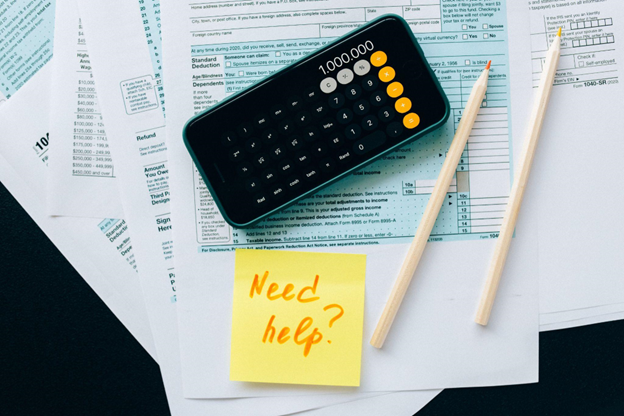Slam The Tax Scam With These Nifty Tips

Image Credits: Pexels
Two things are inevitable in life:
- Paying Taxes
- CRA Scams
With tax season, comes the scammers and frauds! They’re always on a hunt to locate innocent prey that falls into their traps and become a new ‘tax scam victim.’
According to a CBC report, almost over 60k Canadians complained about getting scam texts and fraud calls threatening to pay taxes over the phone or via email.
Scammers are trying really hard, from texts to calls and emails, to get your personal information and the money!
Argh, only if they focus on getting proper jobs and not scamming people to make money. So, how can you protect your hard-earned money from tax scammers?
Let’s find out!
Why Are Tax Scams So Pervasive?

Image Credits: Pexels
“Basic tax codes and filing details are new and strange to most people,” says Kent Welch at First Orion.
The very unfamiliarity and inexperience towards taxes make us vulnerable and susceptible to tax scams.
Tax thieves know this weak point, so they try different means every tax season to scam people.
Latest Tax Scams To Look Out - Types

Image Credits: Pexels
Typically, CRA tax frauds start with a spam email posing as the CRA.
These spam emails may lead naive consumers to:
- Phishing
- Malware-infected websites
- Malicious attachments (spyware, backdoor, or financial malware)
- Remote key trojans impersonating legal files
These threats are meant to collect personally identifiable information (PII) from unwary users, which an attacker can subsequently exploit to gain access to the victim's accounts or sell the data on underground markets.
We’ll get to the tips in a minute, but first, here's what you need to be aware of in order to file your taxes smoothly in Canada.
1. Tax Refund
Scammers are now targeting tax offices, payroll persons, human resources posts, and any additional organization that may have an employee's W-2 forms on record with phishing attempts.
2. Credit Deductions
Tax scammers might entice an individual to invest in fake charities and donations in order to reduce their taxes (using deductions).
Bonus: Click to check the Official Canada website to find a list of registered charities and other non-profit organizations.
3. Phone Calls
Auto-generated text messages and bot-spam calls are common forms of tax phone phishing.
The caller may know your address or the last digits of your SSN and may employ aggressive convincing methods to get you to pay a bogus tax bill via bank transfer, debit card, or even a gift card.
4. Identity Theft
Scammers can get your personal information through your social media, so it’s wise to be extra careful in sharing any sensitive data online.
They can then use the data to send you malicious emails or call you pretending to be a CRA agent.
Unless you want to become a victim of identity theft and tax scams, don’t share your SSN or TIN carelessly.
5. Tax Return
According to Canadacis, almost 79,500 CPAs have been in demand in recent years.
And this demand only increases during the tax season when almost everyone is looking for a professional to file their taxes accurately.
However, tax scammers also take the sudden CPA rise as their opportunity to act like one. They pretend to be a professional and offer help with tax preparation and return.
3 Tips To Avoid Becoming A Tax Scam Victim

Image Credits: Pexels
CRA scams are one of the common tax frauds people suffer from during the tax season in Canada. Here’s how to avoid them:
1. Don’t Be Flustered!
Kent Welch says the common tactic of tax scammers is to make the individual flustered, so they take abrupt actions.
- For instance, you might receive a call from an unknown number pretending to be a CRA agent. Then, demanding you deposit the money now to clear your additional tax bill
The first thing you should do is calm your nerves! And then think and analyze the situation. Finally, you need to verify the information by calling the official CRA help number.
Yes, transferring the money shouldn’t be even your last option. That’s not how tax payment works! :)
2. Don’t Listen; Hang Up!
The more you listen, the more you’ll feel threatened and provoked to take immediate action.
To be fair, they know the story and words that will really pinch the taxpayer in making them believe what they are listening to is the truth.
- You've most likely received the call: An automated message threatening you with arrest if you don't pay your taxes. Yep, you hung up but felt intimidated.
- So, if you call back, you'll be threatened by someone pretending to be a high post agent representing the Canada Revenue Agency.
You just need to hang up and not respond to such calls right from the first sentence because:
- First, the CRA will never call you like that, demanding your information or conformation
- Second, you can check and verify the number from the website to see what’s going on
- Lastly, all your tax status and information is right in your taxpayer account, so that rules out any need to share your personal data again
If you feel there’s something fishy about the call or email, just straight up ignore it and be on your way.
3. Verify The Letters
If you’ve received an email or a letter in your mailbox that says from the CRA, you need to cross-check things first!
- If you run a company and someone in the business connected you with an accountant, you should check the license, registration, and any solid proof of their professional identity
- If you hired an accountant for taxes and received a mail recently demanding some money to deal with your tax preparation and filing, directly call or even meet with the person
- If you received a letter from CRA that says to e-transfer, the remaining taxes say for your student fee, child support, etc. Verify the letter on their website
Any call, email, text, or letter that sounds aggressive and threatening is possibly a scam alert.
Bonus: Click to read helpful business tax tips to ensure your company is safe from tax scams and penalties.
5 Additional Tax Tips To Avoid Tax Frauds

Image Credits: Pexels
It’s better safe than sorry!
You must prepare to verify, check, and analyze anything related to CRA or your taxes to ensure you don’t lose your money to scammers.
Here are some bonus tips:
- If the CRA call or text asks you to buy a gift card/iTunes card or wants you to e-pay immediately - Folks, it’s a scam alert!
- If they threaten you about the ‘arrest’ or ‘police’ - ditch the call!
- If they call and ask you to enter your personal or financial information into an online form (via a clickable link) for a tax return or refund - know that’s a fraud!
- If the person claims to be a CRA who wants to meet you regarding your tax payments or refund - run the other way because it’s fake!
- If you received a text on the phone or a message on your social media platforms claiming to be from the CRA - ignore it!
The CRA website says: “there’s a possibility an official agent will call you to discuss some tax details, but that’s about it!”
They won’t ask you to meet, make immediate payments, threaten you about the arrest, etc.
Bonus: Click to see a video recorded call between a tax scammer and tax expert to prepare well for the season.
Where To Report Tax Scams In Canada?
Tax scams and calls are common worldwide. People pretend to be professionals to take money from taxpayers who are already stressed about their tax filing.
So, if you ever receive such calls or are already tired from dealing with all those fake texts, emails, and even letters, it’s time to report them!
- Contact the Canadian Anti-Fraud Centre to report the issue
- You can contact them on the provided number
- You can report online via their official website
Surely, they can help you out in figuring out the situation.
What To Do If You’re A Tax Scam Victim?

Image Credits: Unsplash
According to Anti-Fraud Centre, if, sadly, you have fallen into the scammer trap and shared your financial details or even money, here’s what you should do:
- Gather all the documents, texts, call recordings, and anything that can prove your innocence
- Take screenshots or emails, texts and make copies of receipts
- Freeze your accounts immediately and report to your credit bureaus and credit company
Lastly, you must report the fraud immediately to the anti-fraud centre.
Bottom Line
That concludes our tax scam protection guide!
We hope by now you have learned the helpful tips to calm your nerves and not fall into the trap of tax scammers.
Lastly, if you want to read more such comprehensive guides, visit Plastk Blogs page. Stay tuned. We’ll be posting more detailed content!


